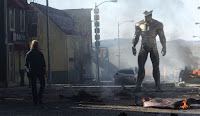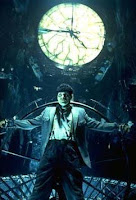You would not believe what I had to go through to get this post up.
Anyway…
A simple element of storytelling is the obstacle. It’s what stands between the characters and whatever they want. An army of Nazis stand between Indiana Jones and the Lost Ark. The possibility of getting caught stands between Ferris Bueller and his perfect day off. The armored construct named the Destroyer stands between Thor and saving the world, but so does the inability to wield his mystic war-hammer, Mjolnir, because of his own doubts of his worthiness.
While opinions vary a bit more on this one, I think an obstacle is slightly different from a conflict. It’s just terminology, but exterior problems tend to be called obstacles, while interior ones are almost always labeled as conflicts. In the example I gave above Thor has to defend his friends from the Destroyer (obstacle), and he can’t wield Mjolnir because of his self-doubt (conflict). Make sense?
Now, while in strict literary terms obstacle is correct, I prefer to use the term challenge. I’ve found that thinking about “obstacles” tends to guide the mind solely onto physical impediments, like parts of an obstacle course. While this isn’t technically wrong, it does tend to result in a lot of the same things. This is when you get challenges that have that sort of “level boss” feel to them. Character A defeats obstacle B, then moves on to obstacle C, and finishes up with D.
Anyway, I did it a while back, but I thought it might be useful to scribble out some tips about challenges. And just so we can have cool, current pictures, I’m going to relate a lot of it to Thor. Some of them you might not have considered before, and a few of them… well, one or two it’s kind of sad that I feel it’s necessary to bring them up.
For example…
You have to have one.
Yeah, this sounds basic, I know, but it’s surprising how often I see stories where people either sit around doing nothing or just stroll through events with no effort. I ranted on about this sort of thing just a few weeks ago. Anything the characters need just appears. Anyone they need is willing to help with or without any motivation to do so. Any lucky break that has to happen does at the precise opportune moment. I know it sounds silly to most of you, but it’s honestly stunning how often this happens in amateur books and screenplays. Heck, it’s bothersome how often it happens in professional writing.
There needs to be something between your characters and their goals. If there isn’t, they would’ve accomplished these goals already. If I want a Diet Pepsi, I go get one from the fridge– that’s it. Hardly material for a bestseller, no matter how much you dress it up. On the other hand, if I want to drink from the Fountain of Youth, odds are there are some immortal pirates and conquistadors in the way, maybe a few alligators, quicksand, and the random swamp monster. That’s a story.
Your characters need a reason to confront it.
If your characters are going to take on a challenge, they need a reason to do it. A real reason. Indy isn’t chasing those Nazis halfway across two continents for an empty crate—he’s doing it for an artifact which represents the sum total of his entire life’s work. Thor isn’t squaring off against the Destroyer because he can’t think of any other way to spend the afternoon—the lives of his friends and innocent civilians are at risk.
 Make sure this reason is really there. It might be obvious in your head why the characters are going to undertake a challenge, but is it that clear on paper? This is especially true for more internal things like Thor dealing with his pride issues, where the audience needs to understand why not being able to lift Mjolnir is such a big deal.
Make sure this reason is really there. It might be obvious in your head why the characters are going to undertake a challenge, but is it that clear on paper? This is especially true for more internal things like Thor dealing with his pride issues, where the audience needs to understand why not being able to lift Mjolnir is such a big deal.
You need a reason for it to exist.
A combination of the first two points. Nothing’s worse than a challenge that only exists to be a challenge. It has no reason for existing in the world of the story, no past, no future, no motivation. It’s only there to serve as an obstacle for the protagonist to overcome. You might remember in Galaxy Quest when Sigourney Weaver loudly points out that the mashing hallway serves no purpose whatsoever. We can probably all think of a book or movie where, for no reason at all, an obstacle just popped out of nowhere. That kind of stuff just weakens any story.
Challenges have a purpose. They’re characters in their own right, or maybe obstacles other characters have set in your protagonist’s way. There’s a reason the Destroyer exists (it protects Odin’s vault), and there’s a reason it’s going after Thor (Loki ordered it to kill him). It didn’t just fall out of the sky and start smashing stuff for no reason. Think about why a given challenge is in your story, and if there isn’t a real reason, stop for a couple minutes and re-think it.
I’ll add one other note here. It’s generally better if the audience (reader or viewer) has at least some idea why said challenge exists. They don’t need to know immediately, but you also shouldn’t save it for the last five pages and say “Oh, the ninjas that have been hunting us for the past week? They were sent by my business rival in Hokkaido…”
It has to be daunting.
 It’s bad enough the Destroyer was built to be the ultimate killing machine, but Thor has to face it with no powers whatsoever. No strength, no armor, no thunder, nothing. Atticus Finch stakes his career, his personal morals, and possibly his life on his defense of Tom Robinson. Jonathan Harker, Dr. Van Helsing, and their companions are the only who ones who know a supernatural monster has arrived in England—one that could kill tens of thousands if not stopped.
It’s bad enough the Destroyer was built to be the ultimate killing machine, but Thor has to face it with no powers whatsoever. No strength, no armor, no thunder, nothing. Atticus Finch stakes his career, his personal morals, and possibly his life on his defense of Tom Robinson. Jonathan Harker, Dr. Van Helsing, and their companions are the only who ones who know a supernatural monster has arrived in England—one that could kill tens of thousands if not stopped.
Characters should never want to deal with a challenge, because let’s be honest– we’d all love it if more things were just handed to us. Again, Diet Pepsi vs the Fountain of Youth. A challenge needs to be something that gives the character (and the audience) pause, or else it isn’t really a challenge. Even John Carter, gentleman of Virginia, Warlord of Mars, and greatest swordsman of two worlds, would occasionally look at the odds he was facing and say “Oh…crap.”
Well, Burroughs was always a bit more eloquent than that, but you get the point.
It can’t be impossible.
There’s nothing worse than being on the wrong side of a sure thing. Nobody reading this wants to get in a fist fight with Dwayne “The Rock” Johnson because we all know it’d be no contest. None of us want to be given the responsibility of stopping a runaway asteroid or even just a runaway bus, because I’m willing to bet for all of us here (myself included) those would be things we just couldn’t deal with.
If you’ve ever watched a boxing match, or any sporting event, you’ve probably noticed they’re evenly matched. NFL teams don’t face off against pee-wee football teams. The Yankees and the Red Sox don’t do practice games against little league. The most boring stories tend to be the ones where the protagonists have no chance whatsoever of meeting the challenge. If you’ve ever watched a horror movie where the killer is merciless, unstoppable, and inescapable… well, that gets pretty dull after the second or third kill, doesn’t it? One of the reasons Jason Voorhees was always scary in the Friday the 13th films (well, the originals, anyway) is that he never ran. He just sort of… marched? It always seemed like somebody had a chance of getting away from Jason if they could just go a little faster… and not trip on a root or a broken heel or something.
The other risk to be careful of here is if the challenge is completely impossible and your protagonist pulls it off anyway, it can look unbelievable and knock your audience out of the story.
Another thing to be wary of is the challenge that seems impossible to the character, but has a painfully obvious solution to the reader. This makes the characters unlikeable, by nature of stupidity, and that’s not going to win anybody points.
It should be unexpected.
This isn’t an absolute rule, but it’s something I still lean heavily toward. It’s the next logical step once you admit there has to be a challenge.
Every heist movie involves an enormous challenge—usually getting past near-foolproof security to break into a vault or museum. There are many chapters or scenes of preparation. Then, almost without exception, in the middle of pulling the actual job, something always goes wrong. There’s a variable that wasn’t accounted for, something the heroes and the audience are not expecting. A new set of guards, new security equipment, or maybe just a drunken woman at the bar who distracts people and throws off the timetable. There have even been a few clever stories where it’s not the heist that has the unexpected twist but the payoff. And this is where the story gets exciting. If my heroes are so trained and ready for anything that the job goes off without a single hitch, there really wasn’t a challenge, was there?
A small bonus of the unexpected challenge is that it often gives your characters a chance to look better. When they beat the unexpected challenge through sheer skill or cleverness, it makes them all the more likable.
You need to resolve it.
Once the writer has set up a challenge, the readers need to see it resolved somehow. We can’t set the Destroyer loose on the world and then just forget about it. To Kill A Mockingbird doesn’t dangle the threat of a mob in front of us for the whole book and then have nothing happen. I can’t have the hero pining over their lost love for the first third of my story and then never, ever address those feelings again. Believe me, your readers will remember these things. Once we, as writers, present a challenge to the audience it can’t be forgotten or ignored. As Chekhov said, if we see a phaser on the bridge in act one, we need to see it fire in act three.
So, if you’re up to it, make sure the challenges in your writing really are challenging, for the characters and for your audience.
Next week I’m going to accept a challenge myself, and talk about something I don’t like.
Until then, go write.




